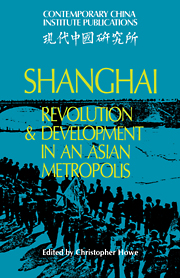Book contents
- Frontmatter
- Contents
- List of illustrations
- Preface
- Foreword
- Abbreviations
- PART ONE THE MODERN HISTORICAL PERSPECTIVE
- PART TWO POLITICAL LIFE
- 2 Political mobilization in Shanghai, 1949–1951
- 3 Shanghai and Chinese politics: before and after the Cultural Revolution
- 4 Shanghai dockers in the Cultural Revolution: the interplay of political and economic issues
- 5 The Shanghai Connection: Shanghai's role in national politics during the 1970s
- PART THREE ECONOMIC DEVELOPMENT AND LIVING-STANDARDS
- PART FOUR THE SUBURBAN TRANSFORMATION
- PART FIVE CULTURE AND IDEOLOGY
- Notes
- A chronology of modern Shanghai, 1842–1979
- Contributors
- Index
4 - Shanghai dockers in the Cultural Revolution: the interplay of political and economic issues
Published online by Cambridge University Press: 14 October 2009
- Frontmatter
- Contents
- List of illustrations
- Preface
- Foreword
- Abbreviations
- PART ONE THE MODERN HISTORICAL PERSPECTIVE
- PART TWO POLITICAL LIFE
- 2 Political mobilization in Shanghai, 1949–1951
- 3 Shanghai and Chinese politics: before and after the Cultural Revolution
- 4 Shanghai dockers in the Cultural Revolution: the interplay of political and economic issues
- 5 The Shanghai Connection: Shanghai's role in national politics during the 1970s
- PART THREE ECONOMIC DEVELOPMENT AND LIVING-STANDARDS
- PART FOUR THE SUBURBAN TRANSFORMATION
- PART FIVE CULTURE AND IDEOLOGY
- Notes
- A chronology of modern Shanghai, 1842–1979
- Contributors
- Index
Summary
INTRODUCTION
The Cultural Revolution is a major landmark in the development of China since 1949, and its impact is felt in Chinese politics even today. The great port city of Shanghai figured prominently in this momentous struggle, both as a bell-wether of revolution and a major arena of conflict. The city's industrial workers were relatively late entrants into the fray, for the students had preceded them by several months. But the entry of the workers was decisive. They had the power – and the willingness to use it – which was to prove the undoing of the Shanghai Municipal Party Committee (MPC). And it is the central role played by industrial workers in Shanghai that justifies the characterization of the struggles of 1966–7 as a ‘Great Proletarian Cultural Revolution’.
In this paper, I wish to examine this role in some detail. The issue has generated a good deal of controversy among students of Chinese politics, but few firm conclusions have as yet emerged. While we cannot rehearse all of the arguments here, there are three basic questions which merit close attention. First, what political and economic issues did the Shanghai workers raise during the Cultural Revolution, and what was the relationship between them? Second, did the incumbent Party authorities attempt to exercise political control over the dissident workers, and, failing in this, resort to offering economic inducements to various occupational groups in order to divert and fragment the workers' movement?
- Type
- Chapter
- Information
- ShanghaiRevolution and Development in an Asian Metropolis, pp. 91 - 124Publisher: Cambridge University PressPrint publication year: 1981

